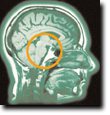-
What are the symptoms?
...
Symptoms of hyperthyroidism can include tremulousness, weight loss, heat intolerance, diarrhea, anxiety and palpitations. In addition, if the tumor is large, patients with thyrotrope adenomas may experience symptoms that any patient with a large tumor in the pituitary area may experience, including headaches, visual loss and/or deficiencies of other pituitary hormones.
→ Pituitary Symptoms
-
What are the causes?
...
A thyrotrope adenoma is a pituitary tumor that secretes TSH.
→ Research Studies
-
Complications
...
Patients with thyrotrope adenomas may experience symptoms of hyperthyroidism, including tremulousness, weight loss, heat intolerance, diarrhea, anxiety and palpitations. These are reversible with treatment of the tumor.
→ Research Studies
-
Preparing for your appointment
Write down questions to ask your doctor.
You're likely to start by seeing your family doctor or a general practitioner. However, in some cases when you call to set up an appointment, you may be referred immediately to an endocrinologist, a doctor who specializes in endocrine (hormonal) disorders.
Special Instructions (If available, please bring):
- Copies of your medical records/discharge summary/physician notes.
- A copy of your MRI or CT on a CD.
- A copy of your lab reports.
- Bring any medications you are taking with you to your appointment.
- Please make sure your MGH registration is accurate and up-to-date.
Our clinic assistants will help you update your hospital registration and insurance information.
Thank you.
→ Appointments
-
How are thyrotrope adenomas diagnosed? ?
...
Thyrotrope adenomas are diagnosed with appropriate endocrine testing in conjunction with a pituitary MRI revealing a pituitary tumor. In such cases, usually hormones made by the thyroid (T4 and T3) are elevated, but the TSH levels are not suppressed as would be expected in primary hyperthyroidism (hyperthyroidism caused by a disorder of the thyroid gland itself, not the pituitary).
→ Newsletter Archive
-
How are thyrotrope adenomas treated?
...
The primary therapy for thyrotrope adenomas is surgery. When surgery does not achieve remission, radiation and/or medical therapy options are available. Somatostatin analogs are the most effective medications currently available for this disorder.
→ Appointments
-
What research is being done on thyrotrope adenomas?
...
The Neuroendocrine Unit is committed to better understanding pituitary tumors and improving treatment options.
→ Research Studies


